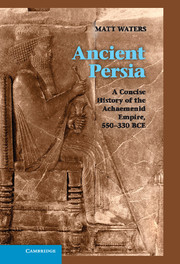Book contents
- Frontmatter
- Dedication
- Contents
- List of Figures
- List of Maps
- Achaemenid Royal Inscriptions and Classical Sources
- Acknowledgments
- Map
- 1 Introduction: Tracking an Empire
- 2 Forerunners of the Achaemenids: The First Half of the First Millennium BCE
- 3 Persia Rising: A New Empire
- 4 From Cyrus to Darius I: Empire in Transition
- 5 Darius, the Great King
- 6 Mechanics of Empire
- 7 Xerxes, the Expander of the Realm
- 8 Anatomy of Empire
- 9 Empire at Large: From the Death of Xerxes to Darius II
- 10 Maintaining Empire: Artaxerxes II and Artaxerxes III
- 11 Twilight of the Achaemenids
- 12 Epilogue
- Appendix A – Timeline
- Appendix B – Chronological Chart of Achaemenid Persian Kings
- Appendix C – Lineages of the Achaemenid Royal Family
- Appendix D – Further Readings
- Notes
- Index
7 - Xerxes, the Expander of the Realm
Published online by Cambridge University Press: 05 June 2014
- Frontmatter
- Dedication
- Contents
- List of Figures
- List of Maps
- Achaemenid Royal Inscriptions and Classical Sources
- Acknowledgments
- Map
- 1 Introduction: Tracking an Empire
- 2 Forerunners of the Achaemenids: The First Half of the First Millennium BCE
- 3 Persia Rising: A New Empire
- 4 From Cyrus to Darius I: Empire in Transition
- 5 Darius, the Great King
- 6 Mechanics of Empire
- 7 Xerxes, the Expander of the Realm
- 8 Anatomy of Empire
- 9 Empire at Large: From the Death of Xerxes to Darius II
- 10 Maintaining Empire: Artaxerxes II and Artaxerxes III
- 11 Twilight of the Achaemenids
- 12 Epilogue
- Appendix A – Timeline
- Appendix B – Chronological Chart of Achaemenid Persian Kings
- Appendix C – Lineages of the Achaemenid Royal Family
- Appendix D – Further Readings
- Notes
- Index
Summary
THE DEATH OF DARIUS AND THE ACCESSION OF XERXES
Stung by the defeat of his forces at Marathon, Darius was furious and immediately began to prepare a much larger campaign. At least this is what Herodotus tells us (7.1) – not that the Father of History would have had any chance of knowing Persian strategic concerns in 490 or, for matter, Darius’ actual words. Herodotus supplies such details, some perhaps from oral tradition, for dramatic effect. That Darius intended another campaign would be no surprise; the Persians were relentless, after all, but no short-term preparations can be confirmed. Darius died in 486, and his son and successor Xerxes had, on his succession, far larger problems than Greece. Herodotus offers no details about Darius’ death but notes that he reigned for thirty-six years, a number confirmed by Babylonian documentation. The latest text to Darius’ reign dates from late December 486; the first to Xerxes’ reign is from early December of the same year, so there may have been some confusion, even in Babylonia, as to the exact date of the transition. Ctesias indicates that Darius died of illness (Fragment 13 §23).
The succession of Xerxes was not without controversy. Herodotus sets his story (7.2–3) near the end of Darius’ reign, when Darius was compelled to choose a successor before he went on campaign, “according to the law of the Persians.” There is no other record of such a Persian practice, and Herodotus’ reference to it here is a bit odd. Darius had undertaken many campaigns previously, as Herodotus himself related without mention of the succession. It is probably a rhetorical statement that served Herodotus’ literary purpose here. Regardless, the issue turned on which son should be successor: his eldest son from his first marriage (before he became king) or his eldest son after he became king. By his earlier marriage to a daughter of Gobryas, Darius had three sons, the eldest of whom was named Artobazanes. Xerxes was the eldest child from Darius’ marriage to Atossa, the daughter of Cyrus, after Darius ascended to the throne.
- Type
- Chapter
- Information
- Ancient PersiaA Concise History of the Achaemenid Empire, 550–330 BCE, pp. 114 - 133Publisher: Cambridge University PressPrint publication year: 2014



